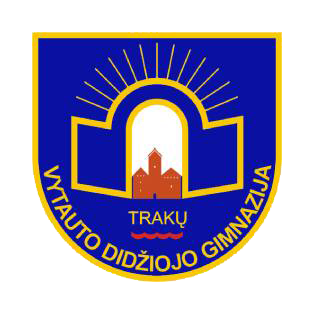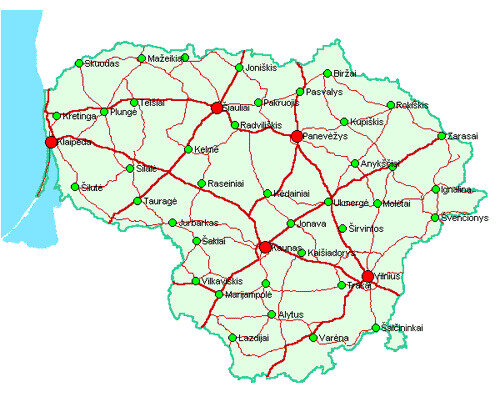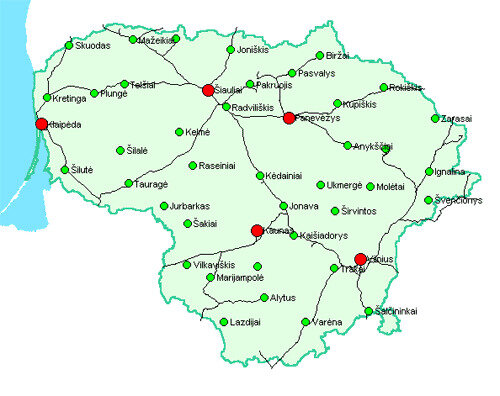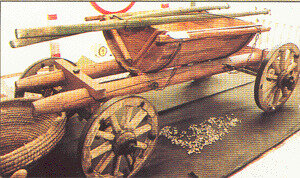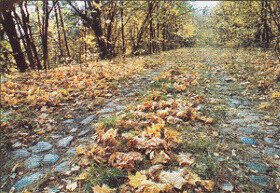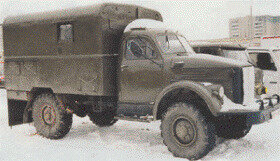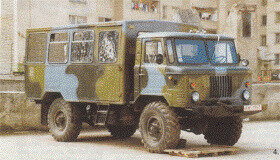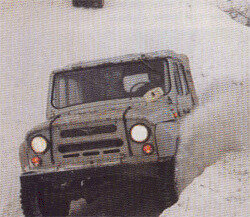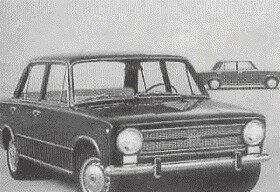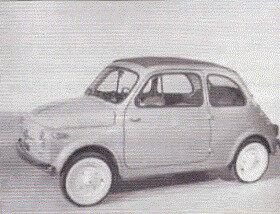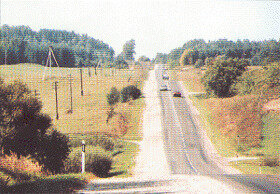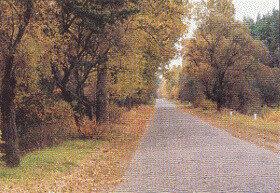Transport and mobility
In case to know more about the changes of transport and mobility and its influence on people's life in Lithuania we have made an oral questioning. There have been asked 6 people, living in the town of Trakai or Trakai district.The oldest respondent was 76 and the youngest one was 62. They were people of different proffesions.
Respondents:
1. Marija Cilbulskienė; b. 1925; housewife.
2. Kamilija Visockienė;b. 1927; housewife.
3. Česlovas Jankovskis; b. 1928; farmer.
4. Jeronimas Jankauskas; b. 1925; doctor.
5. Aleksandras Rezanovas; b. 1931; ex-teacher.
6. Vanda Lukoševičienė; b. 1938; backer.
Transport in its wide meaning is the field of material production related to transference of people and transportation of goods. This meaning of transport could be found in any dictionary. However, to us, ordinary people, this term has a simplier meaning. This word just associates with a car, a bicycle, a plane, a cart and others.
Roads in Lithuania
Today's transport differs from the first means of communication as day and night. It is worth knowing the most important dates in the appearing and development of transport.
The first railways appered in Lithuania in the XIX century, at the beggining of the 7th decade. It was the Kaunas - Virbalis branch line of the Petersburg - Warsaw railway. Then modern electric trains appeared, and the number of the itineraries has increased dozens of times.
Railroads in Lithuania
he first aviation line in Lithuania, Klaipeda - Karaliaučius, started operating in 1927. It was used to transfer the passengers and mail. Later, regular passenger communication started functioning. As time flew, the planes improved, air transport became of more high - capacity.
The year 1896 - the first car in Lithuania was a 'Panhard-Levasseur ' car with 3,5A6 engine, being able to go at the speed of 40 - 45 km per hour. The cars, that only German officers, ministers and other great officers used, appeared in Lithuania about 1935 - 1940. The people who were not well-off commute only on horses , on foot and on sledges in winter. These means of transport are still used in Lithuania.
The famous tip-up cart " kalamashka", main equipment used for building the Žemaičių macadam road
The road Vilnius-Trakai, one of the oldest cobble-stone roads in Lithuania
Since 1940 Lithuania was occupied by the Soviet Union, so all the cars were only from Russia : GAZ, MOSKVICH,VOLGA. Besides, Lithuanian roads were very difficult to drive through , and only at the begining of 1960 they were started being laid with asphalt. Before that it was difficult to go by car as in Lithuania there were only graveled roads, except for the sreetts in the cities that were cobbled.
Later motorbikes, buses, trolleybuses, trucks and tractors gushed Lithuania. In 1928 the buses from Kaunas went to 33 districts in Lithuania.
Gaz 63
Gaz 66
In ancient times it was tried to use the water transport for inner communication - for the transportation of goods.
Every means of transport were being improved, the number of them and demand was growing. The changes of transport were obvious: there are no more first cars in the streets, air and rail transport is flourishing, though water communication does not make big influence on our lives.
The most popular means of transport in Lithuania are cars. Earlier it was quiet difficult to buy a car as they were very expensive. So there were not so many people who could afford buying cars. Besides, the number of cars was strictly limited by Soviet bureaucrats. Nowadays almost every Lithuanian has a car, because there are no problems buying it, if a customer hasn't any ambitions and is satisfied with a second - hand car.
Other means of transport used in Lithuania for the inner communication are buses, trolleybuses(in the cities of Vilnius and Kaunas), bicycles and trains. For long journeys Lithuanians choose cars, planes, trains or buses, but that depends on the circumstances.
The biggest part of cars used in Lithuania nowadays is from West, but of course we can see an old ' ZIGULI ' as well.
Uaz
Vaz 2101
Zaz
Having asked the citizens of Trakai, it became clear that transport is important to everybody : every day we go to school, to work, we come back home, travel to other cities and countries. Now it is not important what means of transport we have, it is more important if it can go and whether we are able to reach any place.
It goes without saying that means of transport have made the world smaller. We can, without any problems, cover enormous distances, that separate us from relatives, friends and acquaintances not only in Lithuania, but in the whole world as well. We only need to take a bus, a car, a plane or a train.
All means of transportation give people freedom of mobility and comfort, selfconfidence and independence from circumstances, save up the energy and time. It is still nice to see in the streets an old car, a horse harnessed to a sledge or a cart, or an old boat navigating in the river or a lake.
First asphalt roads
The Vilnius-Kaunas-Rykantai-Lazdenai road section of concrete cubes built in 1930-1938
We think that there is no special need in using old means of communications, but it is always good and pleasant to remember the development of transport from horse to car, from train to plane .
Information collected and propired by the 9r form students
Reda Jankauskaitė
Agnė Naslėnaitė
Irina Jankovskaja
Laura Vasiulytė
Viktorija Cibulskaitė
Jovita Visockaitė
Rusnė Jurkšaitytė
Irena Parangovskaja
Auksė Sinkevičiūtė
11r form students
Laura Skirmantaitė
Vaida Sabaitytė
11b form student
Edita Stefanovič
Teachers
Julija Lavrinovič
Danguolė Kuzborskienė
Wartime experiences
5 citizens of the Republic of Lithuania have agreed to share their remembrances of the Second World War and the past-war period:
- Elena Kilciauskiene (born in 1937; living in the village of Grendave; Trakai district).
- Valentina Sivkova (born in 1932 in Belarus; living in the village of Buda; Trakai district).
- Elena Jakutiene (born in 1912; living in Vilnius).
- Marija Abuceviciene (born in 1921; living in the village of Ismonys; Trakai district).
- R. Griciene (born in 1930; living in Trakai).
All the interlocutresses still remember, how the Soviet Red Army occupied Lithuania in June of 1940. "The tanks of Russian Army, horses and soldiers marched through the town of Siauliai."(R.Griciene). Some people there (especially the people belonging to other nations; not Lithuanians) met the occupants 'with flowers and smiles (in Zarasai), but the biggest part of natives were silent and looked down with contempt'. (E.Jakutiene).
'Well-being',promised by the occupants, was deportations to Siberia. They started in 1941. There were the mass deportations to the depth of Russia. The occupants deprived men of means of property and deported them to concentration camps'. (E.Jakutiene.). 'Intellectuals, landowners, teachers, priests and others have been deported'.( M. Abuceviciene).
The war between the Soviet union (theUSSR) and Germany broke out in summer of 1941. At first Lithuanians set their hope on this war and believed that independence would be taken back, but very soon they gave up their hope.
The Nazis even didn't want to hear anything about independence of Lithuania. (E. Jakutiene).
There began pogroms of Jews just because of their nationality and religion. There were no Jews remained in Lithuanian towns. (E.Jakutiene, M.Abuceviciene). The Nazis were very cruel to Russian prisoners of war: they were starved to death; were deported for forced labour to Germany or sent to the front-line. (E.Kilciauskiene). During wartime it was very difficult in Lithuania. There was a lack of soap, sugar, salt and other food.
During the period of Nazi occupation the institutions of education, such as schools, were opened and there worked the teachers, who were not deported by Russians to Siberia, only the member of German lessons grew and this language became compulsory in all the schools. (G.Gricienė). However the schools incured losses. For example, in Siauliai the buildings of Boys and Girls Gymnasiums were taken by German authorities and instead of them the 'arbeitsamt' was established in those premises. (R. Gricienė) At that time the classrooms of gymnasium were distributed in different houses. There was a lack of books and notebooks. Primary schools and pre-gymnasiums were in villages and towns. Most of the teachers were against the occupants and educated children according to the spirit of national Lithuanian traditions.
V. Sivkova (born and grown in Belarus) remembers, that nobody took care of education during wartime. The teacher-communist was shot by Germans and there were battles between German and Soviet partisans in the environs.
In 1943 Germans retreated from Belarus and took people with them for forced labour in Germany. So V. Sivkova and her parents found themselves in Germany and worked for a farmer Lizaveta (Elisabeth). Then Americans occupied that part of Germany and the family of Sivkova returned to the Soviet zone and later on to Belarus. The homeland was starving.
In summer of 1944, when Germans were retreating from Lithuania, a lot of Lithuanians retreated to Germany too, because of fear of Soviet terror. (E.Jakutiene).
When the front-line came nearer, people had to hide in the forests, shelters and holes from bombs, but there were and some places where there weren't any hostilities. When Russians came it became more frightful. (E. Kilciauskiene). The terror began and people were taken to the Red Army. There began resistance against the new occupants in Lithuania as well. The partisans appeared in the forests, Soviets formed detached forces of 'nation defenders' (they were called as 'stribai' by ordinary people), KGB encircled. Some of them used to come in the afternoon, the other ones-at night. (M.Abuceviciene).
The life of all Lithuanians was ordered by communists-bolsheviks. All women, that agreed to share their remembrances, say, that war is the biggest calamity of humankind and they don't wish anybody to experience it. 'I pray God for peace.' (E. Jakutiene).
War brought a lot of disasters for people and scattered them all over the world. I wish to feel it neither for my children, nor for my grandchildren. (R. Griciene).
'During the years of war, I looked death in the face and so I became brave and tougher. War showed me what humans have to be afraid of in their life'. (V. Sivkova).
Information collected by the 2bH form students
Indre Charunaite
Erika Dobrovolskaite
Sonata Kilciauskaite
Loreta Kovalevskyte
Indre Vaicekauskaite
Teacher
Gediminas Mickonis
